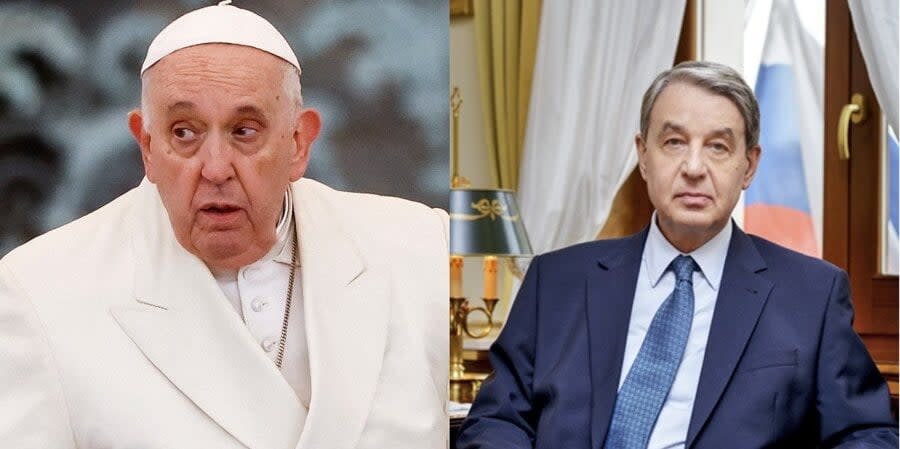Ukraine's ambassador to the Holy See elaborates on ties between Pope and Russian ambassador

- Oops!Something went wrong.Please try again later.
"Mr. Avdeyev already has almost ten years of experience at this position,” Yurash said.
“Of course, it is the end of his career, he is almost 80. He was Culture Minister in Russia and according to tradition, he was sent somewhere to end his tenure.”
Read also: Vatican ready to mediate between Ukraine and Russia, media report
Avdeyev and Pope Francis arrived at the Vatican in 2013 at almost the same time, the diplomat said.
"They are, actually, the same age and they’ve been close friends since 2013 when they both appeared at the Vatican,” he elaborated.
“One of them came there from Argentina, while another from Russia.”
Read also: Pope Francis calls war in Ukraine global, says he doesn't believe it will end soon
Yurash noted that Avdeyev "always speaks very abstractly" about the latest events.
The Ukrainian embassy, instead, speaks transparently about the atrocities and murder that Russian soldiers committing on Ukrainian territory.
"Today, for example, we once again reminded them about this atrocity that is now on the table and discussed by everyone – the beheading of a Ukrainian soldier by Russian sadists – we're delivering this information," the ambassador said.
He said many people in the Vatican don't like that attitude because they "would prefer to think about some universalist ideologies, as Mr. Avdeyev does."
Avdeyev once rebuked the Pope "for his famous phrase that it was not the Russians to be blamed for the murder and atrocities in Ukraine, because they are a people of a great humanitarian culture," Yurash shared.
"By the way, this is another myth about extremely powerful Russian culture that Russians allegedly can't be cruel or can't have totalitarian thinking because they were brought up on the best intellectual examples of Dostoevsky and Tolstoy,” the ambassador to the Vatican said.
“That's why the Pope meant that it was not Russians – but Buryats and Chechens (other ethnicities within the Russian empire) – who murdered people. Therefore, Russian Ambassador Avdeyev was forced to officially make demands and claims in this situation. I know that the State Secretariat sent informal letters to Russia explaining this Pope's words.”
Read also: Where does the Pope get his information on Ukraine and Russia? – Ukraine’s Ambassador to the Vatican
This year the Pope's Easter message was titled in Latin "Urbi et Orbi," which means "to the city and the world.” It reads:
"Help the beloved Ukrainian people on their journey towards peace, and shed the light of Easter upon the people of Russia."
Pope Francis also urged the international community to seek peace and to be united.
He has often called Ukrainians" martyrs”, and used words like "aggression" and "violence" when speaking about the Russian army's actions since it launched its full-scale invasion of Ukraine.
On April 7, the Vatican decided to join together statements from Ukrainian and Russian children at the Station of the Cross in Rome. Texts were read on behalf of a Ukrainian teenager from occupied Mariupol who found refuge in Italy, and a Russian whose brother was killed in the war against Ukraine and whose grandfather and father are missing.
Read also: Ukrainian and Russian women carry cross together at Via Crucis in Rome
Oleh Nikolenko, spokesperson for Ukraine’s Ministry of Foreign Affairs, called this action an attempt to equalize a victim and its aggressor.
Peace agreements would only be possible after a Ukrainian victory, the punishment all Russian war criminals, their repentance for suffering they've caused, and a request for forgiveness from Ukrainians, Nikolenko reiterated.
We’re bringing the voice of Ukraine to the world. Support us with a one-time donation, or become a Patron!
Read the original article on The New Voice of Ukraine

